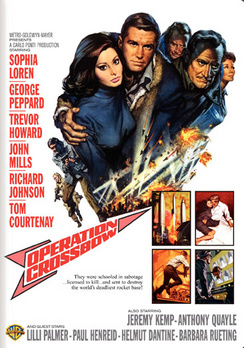
OPERATION CROSSBOW
UK, 1965, 115 minutes, Colour.
Sophia Loren, George Peppard, Tom Courtenay, Trevor Howard, John Mills, Richard Johnson, Jeremy Kemp, Paul Henreid, Anthony Quayle, Lilli Palmer, Helmut Dantine, Richard Todd, Sylvia Syms, John Fraser.
Directed by Michael Anderson.
Operation Crossbow is one of the many big-budget war films made during the 1960s. During the 1950s, there were many more small-budget black and white war memoirs and tributes to particular individuals or particular groups. With the twenty-year anniversary after the war, there were much bigger-budget films more with the spirit of adventure films like The Great Escape, The Heroes of Telemark, The Counterfeit Traitor, The Battle of the Bulge.
This film is about a raid against Hitler’s rockets, especially the Doodlebug, which could have reversed Germany’s fortunes at the end of the war. The film also focuses on Hannah Reitsch, played by Barbara Rutting, who was a pilot who actually tested these planes and rockets.
With a foundation in fact, the film builds up a very tense and colourful adventure. While Sophia Loren and George Peppard have the star billing, the film is much more a British project with stalwarts like Trevor Howard, John Mills, Richard Johnson, Tom Courtenay, Jeremy Kemp and Anthony Quayle. Paul Henried, a star of many Hollywood films in the 40s, has a role as a German and the perennial German of World War Two films, Helmut Dantine, also appears. Richard Todd and Sylvia Sims, John Fraser are also in the supporting cast. The film is interesting with such a gallery of actors.
The film was directed by Michael Anderson who had a mixed career. He made one of the most significant war tribute films of the 1950s, The Dam Busters. He also directed, two years later, the Oscar-winning extravaganza, Around the World in Eighty Days. He had a mixed career until the 1990s with science fiction like Logan’s Run and a film version of John Paul II's The Jeweller’s Shop.
1. The appeal of this kind of war film? Enjoyment value, reflection value? As a film of the sixties considering the war of twenty years earlier?
2, The importance of the English framework of the film? The British attitude towards the war? The presentation of Churchill and his speeches and intentions? Duncan Sandys? The discussions about what the Germans were doing? The work on aerial photography and espionage? The picturing of British Intelligence work? The clash of opinions, especially from Professor Lindeman? The British consideration of intelligence and information?
3. Comment on the danger to England of Germany's preparation of aerial warfare? The nature of the bombs, the impact of the bomb on England and Germany? The consequent deaths?
4. The plan for sending the recruits to Germany? The details of their interviews, the importance of Bamford appearing and the later revelation of his being a spy?
5. The presentation of German success? The detailed testing of the planes? The interest of the German High Command? The pilots and the scientists? The risks to life?
6. Comment on the three characters and their taking over other people's identities? The morality of espionage? The consequences of torture and death?
7. The character of Henshaw: his background his impersonation, the fact that he was recognized by Bamford? his torture and the pathos of his death? The impact of his death within this film?
8. The contrast with Bradley: his style, his success, his final death for the success of the mission?
9. Curtis and the contrast with the others: the focus of the film, his personal style and ability for coping, the unexpected arrival of the wife? His encounter with her and holding her? His work in the factory, his heroics to sabotage the planes and the bombs? How convincing a hero?
10. The importance of the appearance of Nora? The threat to the plan? The element of human feelings? Nora's hopes for a permit and for her child? Her resignation to allowing Curtis to go on? The suddenness of her death? The role of Frieda, as a counter-agent? The reasons for her killing Nora?
11. The presentation of the Germans: the High Command, the supervising Generals, General Lintz and his supervision of the work, Bamford and his role in the factory?
12. How spectacular the final suspense and explosions? Their impact and significance?
13. The film's attitudes towards war and people? A good war film?